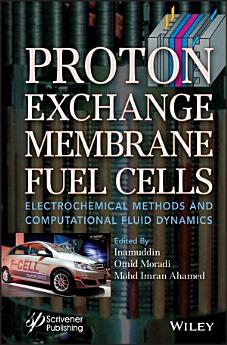Proton Exchange Membrane Fuel Cells: Electrochemical Methods and Computational Fluid Dynamics
Despre această carte electronică
Edited by one of the most well-respected and prolific engineers in the world and his team, this book provides a comprehensive overview of hydrogen production, conversion, and storage, offering the scientific literature a comprehensive coverage of this important fuel.
Proton exchange membrane fuel cells (PEMFCs) are among the most anticipated stationary clean energy devices in renewable and alternative energy. Despite the appreciable improvement in their cost and durability, which are the two major commercialization barriers, their availability has not matched demand. This is mainly due to the use of expensive metal-catalyst, less durable membranes, and poor insight into the ongoing phenomena inside proton exchange membrane fuel cells. Efforts are being made to optimize the use of precious metals as catalyst layers or find alternatives that can be durable for more than 5000 hours.
Computational models are also being developed and studied to get an insight into the shortcomings and provide solutions. The announcement by various companies that they will be producing proton exchange membrane fuel cells-based cars by 2025 has accelerated the current research on proton exchange membrane fuel cells. The breakthrough is urgently needed. The membranes, catalysts, polymer electrolytes, and especially the understanding of diffusion layers, need thorough revision and improvement to achieve the target. This exciting breakthrough volume explores these challenges and offers solutions for the industry. Whether for the student, veteran engineer, new hire, or other industry professionals, this is a must-have for any library.
Despre autor
Inamuddin, PhD, is an assistant professor in the Department of Applied Chemistry, Aligarh Muslim University, Aligarh, India. He has extensive research experience in analytical chemistry, materials chemistry, electrochemistry, renewable energy, and environmental science. He has worked on different research projects funded by various government agencies and universities and is the recipient of multiple awards, including the Fast Track Young Scientist Award and the Young Researcher of the Year Award for 2020, from Aligarh Muslim University. He has published almost 200 research articles in various international scientific journals, 19 book chapters, and 145 edited books with multiple well-known publishers, including Scrivener Publishing.He is a member of various editorial boards for scientific and technical journals and is an editor on several of them in different capacities.
Omid Moradi, PhD, is an associate professor in the Department of Chemistry, Islamic Azad University, Shahre Qods Branch, Shahre-Qods, Tehran, Iran. He received his PhD in physical chemistry in 2009 from the Science and Research Branch, Islamic Azad University, Iran. He is ranked among the world’s top 2% of scientists according to Stanford University rankings in 2020, and he is the director-in-chief of a technical journal in chemistry.
Mohd Imran Ahamed, PhD, has co-edited more than 20 books and has published numerous research and review articles in scientific and technical journals. He received his PhD from Aligarh Muslim University, Aligarh, India in 2019. His research work includes ion-exchange chromatography, wastewater treatment and analysis, bending actuators, and electrospinning.








